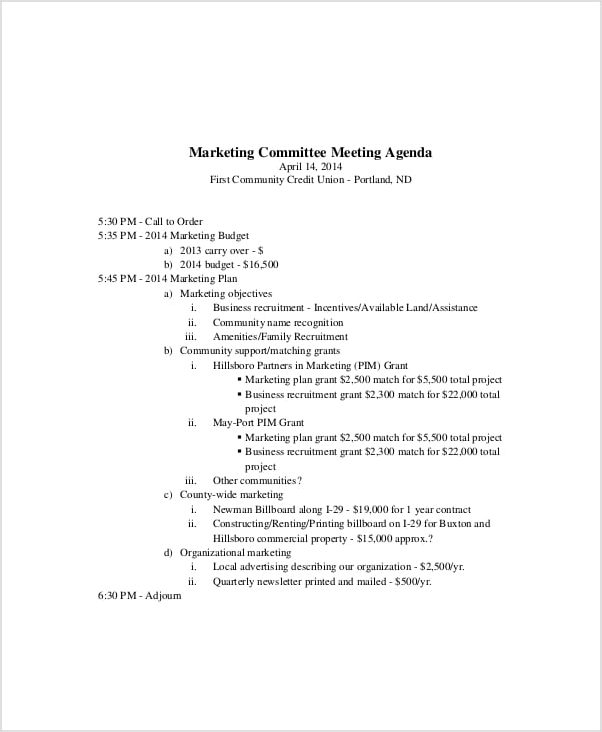A marketing meeting agenda is a document that outlines the topics, goals, and objectives to be discussed during a marketing team meeting. It serves as a roadmap for the meeting, ensuring that all necessary topics are covered and that the meeting stays focused and productive. A well-planned agenda can help streamline discussions, prioritize tasks, and keep everyone on the same page. In this article, we will explore the key components of a marketing meeting agenda and provide tips on how to create an effective one.
Why is a Marketing Meeting Agenda Important?
A marketing meeting agenda is important for several reasons. Firstly, it helps set expectations for the meeting by providing a clear outline of what will be discussed. This allows attendees to come prepared and ensures that the meeting stays on track. Secondly, an agenda helps prioritize topics and allocate appropriate time for each item. This prevents the meeting from going off-topic or running over time. Lastly, a well-structured agenda serves as a reference document that can be used to track progress and follow up on action items after the meeting.
How to Create an Effective Marketing Meeting Agenda
Creating an effective marketing meeting agenda involves careful planning and consideration. Here are some steps to help you create an agenda that drives productive discussions and achieves desired outcomes:
1. Define the Purpose of the Meeting
Before creating an agenda, it is important to clearly define the purpose of the meeting. Ask yourself what the main objectives are and what you hope to achieve by the end of the meeting. This will help you determine the topics that need to be discussed and the desired outcomes.
2. Identify Key Topics
Once you have defined the purpose of the meeting, identify the key topics that need to be covered. These topics should align with the goals and objectives you have set. Consider the most pressing issues, upcoming campaigns, performance metrics, and any other relevant topics that need to be addressed.
3. Prioritize and Allocate Time
After identifying the key topics, prioritize them based on their importance and allocate appropriate time for each item. Be realistic about the time needed for discussions and make sure to leave some buffer time for unexpected discussions or questions. It is important to strike a balance between covering all necessary topics and allowing for meaningful discussions.
4. Invite the Right Participants
Invite the right participants who have a direct stake in the topics being discussed. Make sure to include key stakeholders, team members, and any other relevant individuals who can contribute to the discussions. Avoid inviting unnecessary participants as this can lead to a larger group and potentially derail the meeting.
5. Provide Pre-Meeting Materials
In order to ensure that all participants come prepared, provide any necessary pre-meeting materials. This may include reports, data, or any other relevant documents that attendees need to review before the meeting. By doing so, you can save valuable meeting time and have more productive discussions.
6. Structure the Agenda
When structuring the agenda, start with a brief introduction that outlines the purpose and objectives of the meeting. Then, list the topics in the order in which they will be discussed. For each topic, provide a clear description, objectives, and expected outcomes. Include time allocations for each item to keep the meeting on track.
7. Leave Room for Discussions
While it is important to have a structured agenda, it is equally important to leave room for discussions and questions. Allow for flexibility in the agenda to address any unexpected issues or concerns that may arise during the meeting. This will encourage active participation and engagement from all attendees.
8. Follow Up on Action Items
After the meeting, make sure to follow up on any action items or decisions that were made. Assign responsibilities and set deadlines for each item. This will help ensure that the discussions translate into actionable steps and that progress is made towards the goals set during the meeting.
Sample Marketing Meeting Agenda
Here is an example of a marketing meeting agenda that incorporates the above steps:
- Introduction: Briefly introduce the purpose and objectives of the meeting.
- Topic 1: Campaign Performance: Review the performance metrics of the latest marketing campaign.
- Topic 2: Upcoming Campaign Planning: Discuss the strategy and goals for the upcoming campaign.
- Topic 3: Social Media Strategy: Present the new social media strategy and gather feedback.
- Topic 4: Website Redesign: Provide updates on the progress of the website redesign project.
- Topic 5: Budget Allocation: Discuss the budget allocation for different marketing initiatives.
- Topic 6: Team Updates: Share any relevant updates or announcements from the marketing team.
- Topic 7: Open Discussion: Allow time for any other topics or questions that need to be addressed.
- Follow-up: Assign responsibilities and set deadlines for action items.
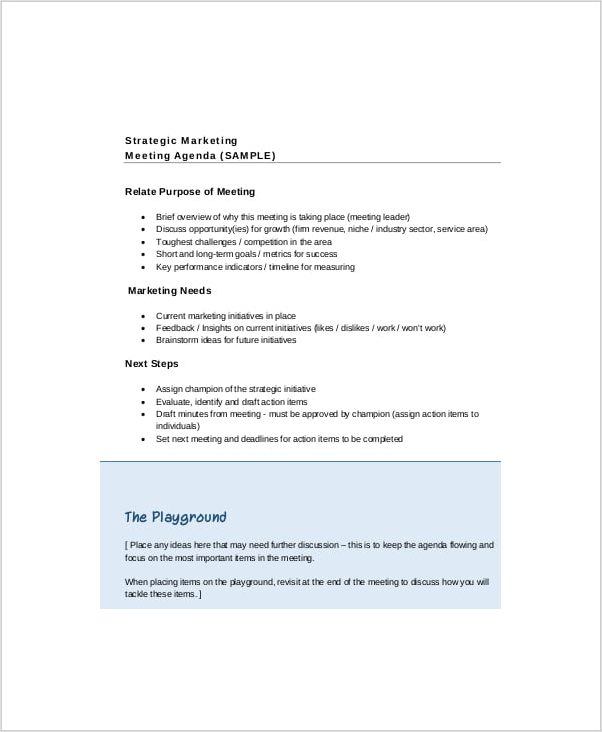
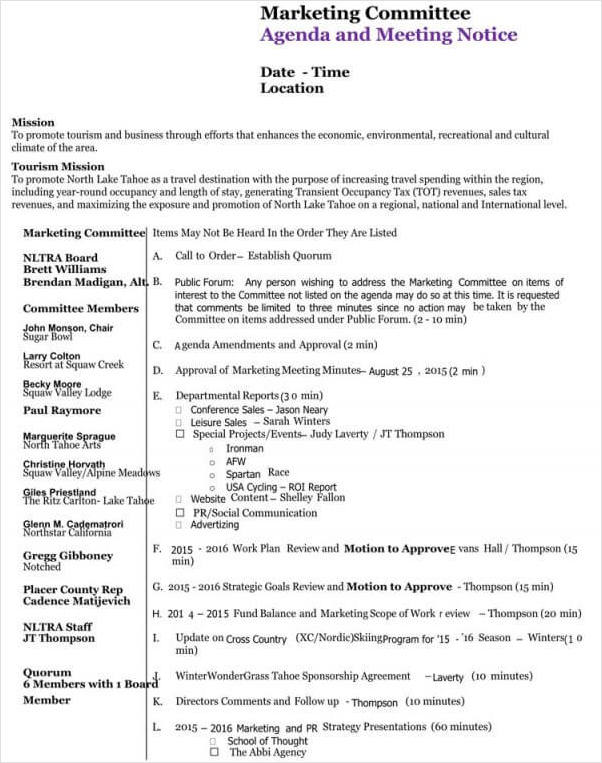
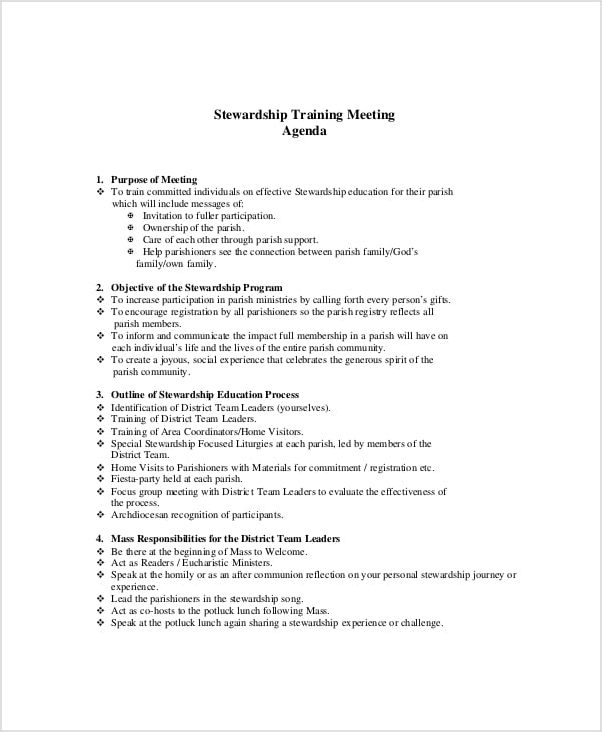
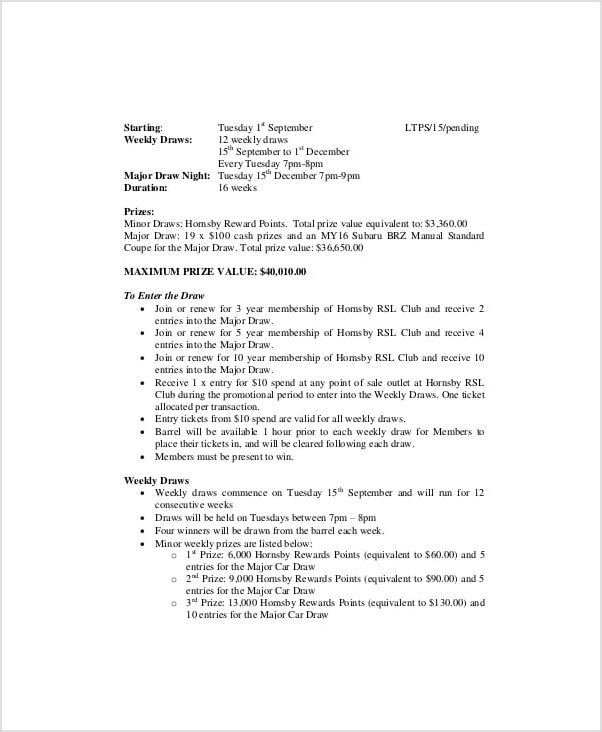
Conclusion
A well-planned marketing meeting agenda is crucial for driving productive discussions and achieving desired outcomes. By defining the purpose of the meeting, identifying key topics, prioritizing and allocating time, inviting the right participants, providing pre-meeting materials, structuring the agenda, leaving room for discussions, and following up on action items, you can create an effective agenda that keeps your marketing team on track and focused. Use the sample agenda provided as a starting point and customize it to fit the specific needs of your team. With a well-designed agenda, your marketing meetings will be more efficient, engaging, and successful.
Marketing Meeting Agenda Template – Download
